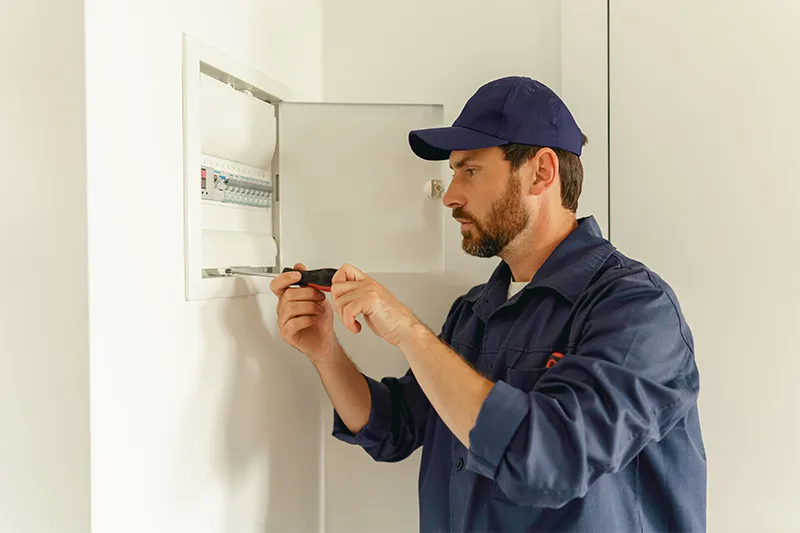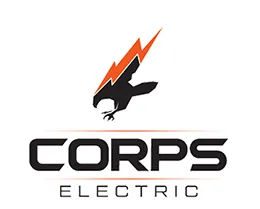Why Does Your Circuit Breaker Keep Tripping? Understanding the Causes and Solutions
 Circuit breakers are essential safety devices in every home, designed to protect your electrical system from overloads, short circuits, and other hazards. When a breaker trips, it stops the flow of electricity, preventing damage to your home and appliances. However, frequent tripping can be frustrating and a sign of an underlying issue that needs attention.
Circuit breakers are essential safety devices in every home, designed to protect your electrical system from overloads, short circuits, and other hazards. When a breaker trips, it stops the flow of electricity, preventing damage to your home and appliances. However, frequent tripping can be frustrating and a sign of an underlying issue that needs attention.
In this blog post, we’ll dive deeper into the common reasons your circuit breaker might be tripping, how to troubleshoot the problem, and when you should call an electrician.
What is a Circuit Breaker and How Does It Work?
A circuit breaker is a crucial part of your home’s electrical panel. Its main function is to cut off electrical flow when it detects abnormal conditions like excess current or a short circuit. This safety feature helps prevent electrical fires, overheating, and potential damage to devices and appliances in your home.
When your breaker trips, it’s essentially protecting your wiring from dangerous levels of heat or current that could cause long-term harm. But if the breaker trips repeatedly, it means your system is encountering an ongoing issue that needs to be addressed.
Common Causes of Tripping Breakers
Several factors can cause a circuit breaker to trip, but the most common ones include:
Overloaded Circuit
One of the most frequent reasons a breaker trips is an overloaded circuit. This happens when too many devices are plugged into a single circuit, demanding more power than the circuit can safely handle. For example, plugging multiple high-power appliances (like a microwave, refrigerator, and space heater) into the same outlet can overload the circuit and cause it to trip.
Solution: Spread out high-energy devices across multiple circuits. Avoid using power strips for large appliances, and ensure that each major appliance has its own dedicated circuit.
Short Circuit
A short circuit occurs when a live wire touches a neutral or ground wire, causing a surge of electrical current. This can result in sparks, excessive heat, and potentially dangerous electrical fires. A short circuit is often accompanied by a burning smell or visible scorching around outlets or appliances.
Solution: If you suspect a short circuit, unplug all devices and examine outlets and switches for any signs of damage. Contact a licensed electrician immediately to inspect the wiring and repair any faulty components.
Ground Fault
Similar to a short circuit, a ground fault happens when a live wire makes contact with the ground wire or a grounded surface. Ground faults are especially common in damp areas like kitchens, bathrooms, and outdoor outlets, where moisture can interfere with the electrical system.
Solution: Make sure that **ground fault circuit interrupters (GFCIs)** are installed in moisture-prone areas to prevent shocks and minimize the risk of tripping breakers. GFCIs are designed to shut off power when they detect ground faults, protecting both your home and family.
Arc Fault
An arc fault occurs when electrical wiring is loose or damaged, creating an arc of electricity that can generate excessive heat. This often happens behind walls or within electrical outlets, making it harder to detect without professional help.
Solution: Arc faults can be dangerous, so it’s important to have arc fault circuit interrupters (AFCIs) installed in your electrical panel to detect and shut off arc faults. If you’re experiencing frequent tripping and suspect an arc fault, call an electrician to assess and upgrade your electrical system.
How to Troubleshoot a Tripping Breaker
If your breaker has tripped, here’s a simple troubleshooting guide to help you identify the cause:
- **Unplug Devices**: Start by unplugging everything connected to the circuit that tripped.
- **Reset the Breaker**: Go to your electrical panel and locate the tripped breaker (it will usually be in the “off” position). Flip it fully to “off,” then switch it back to “on.”
- **Test Devices**: Plug devices back in one by one. If the breaker trips again after plugging in a specific appliance, that appliance might be the cause of the problem.
- **Check for Visible Damage**: Inspect outlets, switches, and appliances for signs of burning, scorching, or exposed wiring. If you notice any damage, stop using the device and contact a professional.
When to Call an Electrician
While some tripped breakers are easy to resolve by redistributing appliances or resetting the breaker, others may signal more serious electrical issues. Here are some warning signs that it’s time to call an electrician:
- Breaker continues to trip, even after reducing the load.
- You notice burn marks, a burning smell, or unusual buzzing noises near outlets.
- Flickering lights or frequent power outages occur in specific rooms.
- Your electrical system is old or hasn’t been inspected in years.
Corps Electric in Oklahoma City is a trusted provider of residential electrical services, with extensive experience in diagnosing and repairing electrical issues. From installing dedicated circuits to troubleshooting complex problems, we can ensure your home’s electrical system is safe, efficient, and up to code. Learn more about our Electrical Services.
How to Prevent Future Breaker Trips
To minimize the risk of future breaker trips, follow these tips:
- **Upgrade Your Electrical Panel**: If your home is older or you’ve recently added new appliances, consider upgrading your electrical panel to accommodate modern electrical demands.
- **Use Dedicated Circuits**: High-energy appliances like refrigerators, washers, dryers, and HVAC systems should each have their own circuit to prevent overloads.
- **Regular Inspections**: Schedule routine inspections with a licensed electrician to ensure your wiring is up to date and your breakers are functioning correctly.
Conclusion
While a tripping breaker can be an inconvenience, it’s also a valuable safety feature that protects your home from electrical hazards. By understanding the common causes of tripping breakers—such as overloads, short circuits, and ground faults—you can take steps to address the issue and prevent future occurrences. If you’re unsure about the cause or unable to resolve the problem yourself, don’t hesitate to reach out to Corps Electric for professional help.
For reliable electrical services in Oklahoma City, contact Corps Electric today and ensure your home stays powered safely.
Corps Electric
Ph. 405-972-3112
